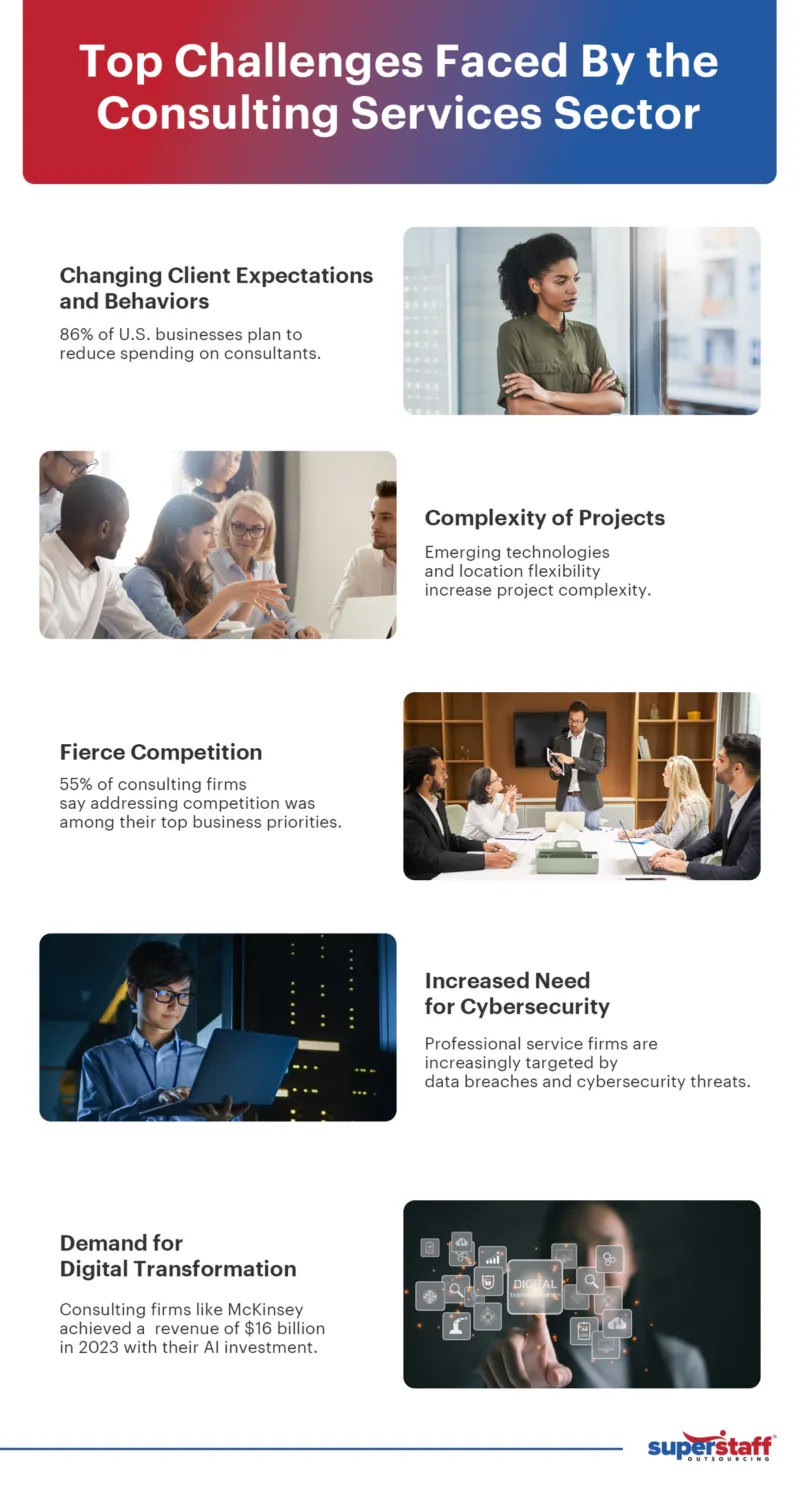
The first quarter of 2024 has been challenging for businesses in the consulting services industry.
As inflationary pressures squeeze corporate revenues, more companies seek to slash their budgets to increase profitability. Powerhouse brands like Adidas and Citigroup are among the many businesses cutting back on management consulting services, creating problems for even the most lucrative consulting firms.
What factors are driving the decline in demand for consulting services? Can outsourcing support the industry during these uncertain times? Let’s explore these questions in detail.
What’s Fueling the Decline in Demand? A Look Into the Challenges Faced By the Business Consulting Services Industry

Changing Client Expectations and Behaviors
According to Source Global Research, the consulting industry is facing a softening of demand, with cost-cutting ranking first in the most discussed topics among senior leadership teams. Over 86% of U.S. businesses plan to reduce spending on consultants.
At the same time, corporate clients are demanding more from their consulting partners. They expect more value at cost-effective rates and prefer faster service delivery at a higher level of quality.
Many businesses have begun opposing billable hours and fixed fees, asking consulting firms for greater transparency when calculating costs. With inflation affecting service costs, clients have started monitoring consultants more closely and maintaining a high level of scrutiny to ensure that every cent they pay adds value to their company.
Real-Life Sample Case
In 2022, Citigroup Inc. hired consultants to reshape its operations, hoping to improve technology adoption and grow its wealth management. The bank developed and executed an ambitious plan to overhaul the company, which included selling off international consumer businesses, cutting jobs, and investing in emerging technologies.
By January 2024, Citigroup’s Chief Financial Officer Mark Mason announced that they’d be shifting their strategies away from consulting expenses. Instead of hiring third-party consultants, they plan to go all-in on digital transformation, reallocating resources to emerging technologies.
Even established firms such as Deloitte, Ernst & Young, and PwC felt the tight market squeeze, which caused them to realign their workforce and lose over 9,000 jobs through multiple layoffs.
Complexity of Projects
Another challenge faced by consulting firms today is the increasing complexity of projects. In the past, business operations were confined to one location, but globalization and technology have enabled companies to work with specialized professionals beyond their home country. Consultants are now expected to coordinate with workers locally and globally while delivering a project on time and within budget.
Emerging tech innovations have also contributed to project complexity. For example, mobile technologies allow clients to gain real-time insight into their projects, so many have begun expecting instant access to information and speedier delivery. Consultants and project managers must embrace the dynamic data environment to thrive in the modern business landscape.
Fierce Competition
Competition is intensifying in the consulting services sector. Decades ago, McKinsey, Boston Consulting Group, Deloitte, and BCG monopolized professional consulting, offering valuable industry expertise and specialized advice that business owners could not access otherwise.
Today, information is readily available on the internet, allowing aspiring business leaders to leverage best practices and proven strategies without hiring a third-party consultant. Add boutique consulting firms and freelancers to the mix, and it’s no wonder why the industry has become more competitive.
According to a Deltek survey, 55% of consulting firms say addressing fierce competition was among their top business priorities. At the same time, 33% plan to sharpen their competitive edge within the next five years.
Increased Need for Cybersecurity
Business and financial consulting firms handle a large volume of confidential client data. Some examples include business plans and strategies, contracts, sales and marketing information, employee profiles, and financial transactions.
Because they handle high-value information, professional services firms are often targeted by tech support scammers, hackers, and other data privacy threats. Consultants must invest heavily in cybersecurity to prevent malicious entities from accessing their clients’ valuable information.
Demand for Automation and Digital Transformation
As mentioned above, companies that once invested heavily in consulting services have begun shifting their resources to technology development. Finding ways to implement artificial intelligence (AI) into their operations is becoming a top priority for many large and small businesses.
Many consultants embrace AI tools and invest in their development to retain their competitive edge. According to a Wall Street Journal article, top consulting service companies like McKinsey use generative AI to streamline processes. Thanks to their AI investment, they achieved a revenue of $16 billion in 2023.
How Outsourcing Project Management Support Can Benefit the Consulting Industry
Now that we’ve discussed the most pressing challenges facing the consulting services industry, let’s take a look at a possible solution: outsourcing.
By outsourcing project management and other back-office roles, firms can more easily align their operations with their client’s expectations, providing high-quality, cost-effective services with speedy project delivery. Here are just a few of the roles you can delegate to the right BPO partner:

Project Manager
Effective project management is necessary to succeed in the consulting business. A project management professional (PMP) will help consultants and their clients bring their plans to life by assembling and leading the team, overseeing project execution, and ensuring everyone stays on track and within budget.
Consulting firms depend on professionals with exceptional project management skills to optimize workflows, collaborate with multiple teams, and complete tasks on time. Since consultants tend to work with limited resources, project managers are also responsible for maintaining budgets, aligning expenses with the project’s goals and requirements, and driving profitability.
Team Leader
Beyond the project manager role, consulting firms and their clients also need a team leader to help turn their ideas into reality. Team leaders guide, oversee, and delegate tasks to different team members, communicating with everyone to ensure they’re on the same page and working together to achieve their goals.
They also work closely with project managers, helping them prepare reports by handling necessary documentation or conducting research before designing project proposals. Ideally, your team leader would utilize KPIs and metrics to monitor your team’s progress and performance so you can deliver measurable results for clients.
Customer Service
If you want your consulting business to thrive amid increased competition, you need to nurture long-term customer relationships. The most effective way to do this is by outsourcing customer support to a reliable call center in the Philippines.
The right BPO partner can provide 24/7 support, allowing your clients to contact you about their inquiries or problems at any time or day. For example, someone wants to follow up on the status of their project or ask for your expert advice on a particular area of their operations. In that case, a representative will always be available to address and resolve their concerns.
Since today’s consulting firms work with clients worldwide, investing in multilingual support is crucial for maintaining customer satisfaction and loyalty. Providing customer service in your client’s preferred language can allow for a more seamless partnership, leading to a speedier and more effective execution of your project goals.
IT and Technical Support
In previous sections, we mentioned the growing demand for digital transformation in the consulting industry. Consulting firms must leverage emerging technologies to keep up with their clients’ ever-evolving needs and preferences to remain competitive in today’s business world.
For instance, consultants may use virtual conferencing apps to schedule meetings and develop project plans with clients from different countries. They can also use remote collaboration tools and project management software to track their team’s progress.
As you embrace new technologies, you’ll need help maintaining your tech infrastructure, systems, and networks. An information technology (IT) and technical support team can be helpful for this exact scenario.
By outsourcing tech jobs to capable professionals, you can ensure that specialists monitor and operate your tech infrastructure, maintain and repair your firm’s computers and devices, and provide needed troubleshooting support for your employees and clients.
Software Programmers and Developers
In addition to IT and tech support specialists, consulting firms may also benefit from working with qualified nearshore software developers. We previously mentioned how many of today’s consulting firms are interested in using AI technology to streamline their processes and improve efficiency.
Whether handling project management tasks or investing in customer service, the right software developer can help your firm accelerate digital transformation initiatives. They can create functional, user-friendly interfaces that will help you meet your client’s business needs and goals.
Financial Services
Giving clients advice and helping them develop and execute successful projects is only one part of your consulting business. To ensure your firm’s financial health, you must also pay attention to the billing and collections process, sending clients accurate invoices and making it easy for them to send payments.
In previous sections, we mentioned that today’s clients demand transparency from their chosen consulting partners. As such, you must ensure that your billing and collections specialists offer complete transparency and accountability by clearly breaking down costs in every invoice.
Once you’ve collected client payments, your outsourced accountants and bookkeepers keep records of every financial transaction. They monitor expenses and profits to assist you in making informed financial decisions and helping you boost overall profitability.
Payroll
Remember: you cannot develop and execute a project alone. Taking care of your team members boosts employee morale and engagement, leading to higher productivity, increased efficiency, and sustainable results.
The best way to show your workers you value their time and hard work is by prioritizing payroll management. Hiring dedicated outsourced professionals to handle payroll functions can ensure your team receives their earned wages on time, including benefits and compensation packages.
Recruitment Process Outsourcing
The size of your team and the specialists you bring on board will depend on the particular scope of the project. With a recruitment process outsourcing team, your consulting firm can easily find and hire the right candidates for your organizational initiatives.
Whether you’re looking for qualified software engineers or certified public accountants, your recruitment specialists can help you broaden your talent search beyond your borders and find the perfect fit for your consulting firm. They can also assist you with employee onboarding, engagement, and team management initiatives.
Knowledge Process Outsourcing
Project management outsourcing goes beyond customer service, administrative support, recruitment, and back-office roles. Working with professionals with specialized expertise may also be necessary to accelerate progress on your project.
Through knowledge process outsourcing, consulting firms can connect with business intelligence (BI) specialists, data analysts, and other specialized roles. These professionals can help consultants forecast future trends, tailor strategies for a client’s specific needs, anticipate market changes, and embrace innovative approaches to business.
Data Scientists and Analysts
Consulting firms handle a large volume of data, from industry pricing strategies to economic and market trends. A dedicated data science and analytics team is essential for transforming raw information into practical insights that consultants can use to give clients relevant and accurate advice.
Armed with expertise in statistical modeling, data science specialists can help consultants make sense of mountains of information. They can identify patterns and trends in the data and translate them into actionable plans that align with the company’s overall strategies and goals.
Leverage Outsourced Project Management Support for Your Consulting Business
Corporate clients now expect more from their consultants, who must balance service quality, speedy project delivery, cost-effectiveness, and transparency. To strengthen your competitive edge in these challenging times, consider partnering with an experienced BPO provider like SuperStaff.
At SuperStaff, we provide a wide range of outsourcing solutions for the consulting services industry, from customer support and IT roles to project management and data science specialists. With our significant cost advantage, you can improve efficiency and productivity while keeping expenses low.
Contact us today to discuss how our BPO services can support and fortify your consulting business!






